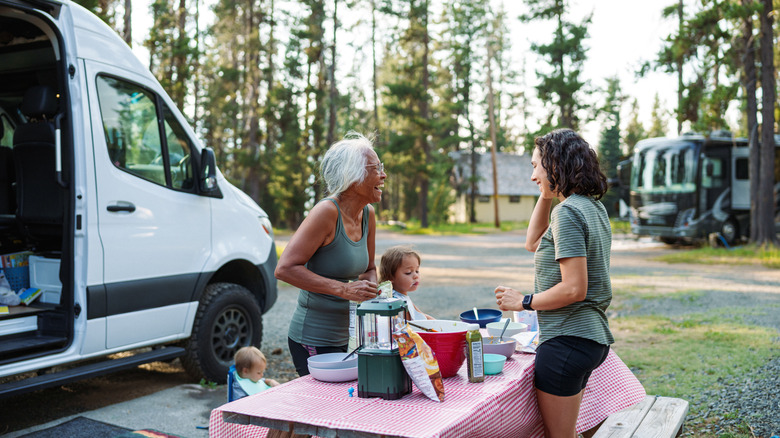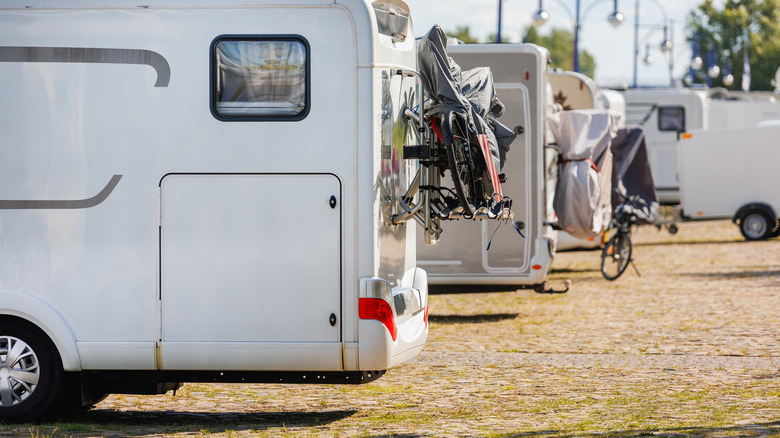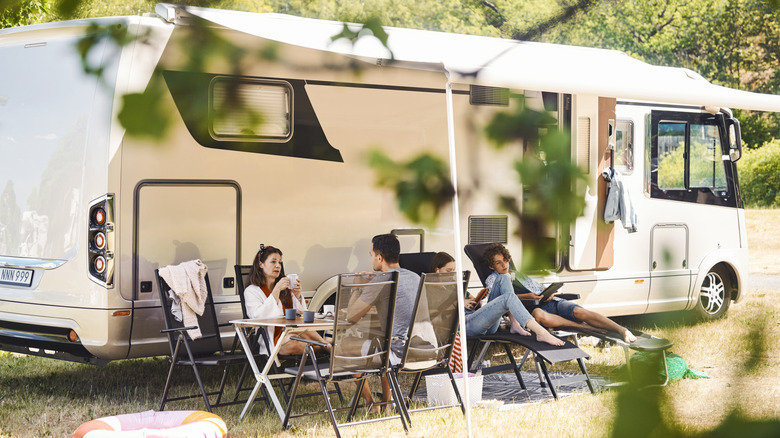The Unspoken RV Camping Rule That Helps Preserve Neighborly Vibes And Vacation Peace
Setting up the perfect RV campsite isn't just about parking in a spot — it's about creating a temporary home away from home that has everything you need. From organizing your outdoor space to setting up cooking areas, chairs, and awnings, you need to be sure that you and your travel group can feel comfortable, which means planning your site layout carefully. That said, just like with any neighborhood or community, there are certain unwritten rules at RV campgrounds that can help everyone enjoy their time there, especially when it comes to your neighbors. After all, being in such close quarters means that everything you do will affect them –– and vice versa.
However, out of all the different ways to be respectful while sharing a campsite, one of the most important rules that beginner RVers sometimes ignore is to always stay within your own site boundaries. A simple courtesy that can make the difference between a peaceful getaway and an uncomfortable experience for everyone involved, respecting your designated space means that you don't crowd or intrude on someone else's area. Similarly, the same principle applies to never taking shortcuts through occupied campsites — even when it means walking an extra minute or two to reach the bathhouse or trash area.
Despite what it might seem, the truth is that this etiquette rule isn't necessarily about being unfriendly or antisocial. In fact, it's quite the opposite. At the end of the day, by respecting others' temporary living spaces, you can help create an environment where everyone feels safe and comfortable. Which, in turn, makes for friendlier, more relaxed interactions across site boundaries. Here's why that matters.
Why walking through another camper's site is a major camping faux pas
Think about how you'd feel if strangers regularly cut through your backyard at home without permission. Well, that same feeling applies at a campsite. When someone you don't know randomly decides to walk through your campsite, it essentially disrupts your privacy, sense of security, and can feel incredibly intrusive, especially when you're relaxing, cooking, or spending time with family.
Plus, considering that most RV travelers choose to go camping specifically to escape from their routines and connect with nature, having strangers randomly walk through their space breaks that sense of tranquility. Even worse, it also creates a wave of discomfort and safety concerns, especially for families traveling with young children or at pet-friendly campgrounds where four-legged guests are simply trying to enjoy the freedom of roaming and playing near their RV. Especially when possibly less-trained pets are involved, having a stranger in their space can create an unsafe environment for all.
With all of this in mind, respecting this boundary ultimately proves that you actually understand camping culture, as well as demonstrates true consideration for others. Even if walking around an entire campground seems a little inconvenient at the time, that small detour can save you from dealing with frustrated campsite neighbors who don't appreciate the intrusion.
Always keep all your gear within your own site boundaries
Respecting campsite boundaries goes beyond not walking through someone else's space — it also means keeping all of your equipment within your assigned area. This includes your RV, truck, chairs, tables, and even your fire pit. After all, when your belongings start to creep into neighboring sites, you're essentially claiming space that isn't yours. After all, RV campgrounds have a designated number of spaces, and each RV only pays for one spot.
Even if it doesn't look like your neighbors are actively using the spot, it's still theirs. The assumption that they wouldn't mind you spreading up a couple of extra feet into their space isn't just presumptuous — it's plain rude. And trust us: The last thing you want is to get into any arguments or confrontations with your neighbors, especially if you're hoping to come back again. The same goes for keeping your noise levels down. Just like physical boundaries, sound boundaries matter as well. When your music, conversations, or general noise bothers people beyond your site, you're essentially invading your neighbors' space in another way.
Finally, if you're unsure where your site boundaries are, don't guess — ask. Speak to the camp host for clarification, or directly to your neighbors (who might even be more knowledgeable about the way each space works). Nowadays, most campgrounds have clear markers or maps that show the exact dimensions of each site, so when in doubt, just guide yourself by those.


